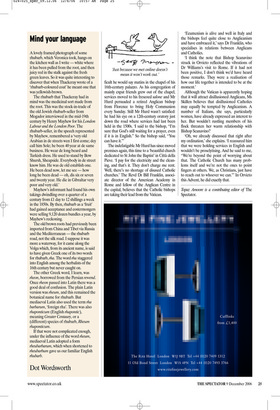Mind your language
A lovely framed photograph of some rhubarb, which Veronica took, hangs on the kitchen wall as I write — white where it has been pulled from the root, and then juicy red in the stalk against the fresh green leaves. So it was quite interesting to discover that when Thackeray wrote of a ‘rhubarb-coloured coat’ he meant one that was yellowish-brown.
The rhubarb that Thackeray had in mind was the medicinal sort made from the root. This was the stock-in-trade of the old Jewish rhubarb-seller from Mogador interviewed in the mid-19th century by Henry Mayhew for his London Labour and the London Poor. The rhubarb-seller, in the speech represented by Mayhew, remembered a ‘very old Arabian in de streets wen I first come; dey call him Sole; he been 40 year at de same business. He wear de long beard and Turkish dress. He used to stand by Bow Shursh, Sheapside. Everybody in de street know him. He was de old establish one. He been dead now, let me see — how long he been dead — oh, dis six or seven and twenty year. He die in Gibraltar very poor and very old.’ Mayhew’s informant had found his own takings dwindling over a quarter of a century from £1 day to 12 shillings a week in the 1850s. By then, rhubarb as a ‘fruit’ had gained acceptance and costermongers were selling 9,120 dozen bundles a year, by Mayhew’s reckoning.
The old brown roots had previously been imported from China and Tibet via Russia and the Mediterranean — the rhubarb road, not the silk road. I suppose it was more a waterway, for it came along the Volga which, from its ancient name, is said to have given Greek one of its two words for rhubarb, rha. The word rha staggered into English among the herbalists of the 16th century but never caught on.
The other Greek word, I learn, was rheon, borrowed from the Persian rewend. Once rheon passed into Latin there was a good deal of confusion. The plain Latin version was rheum, and this remained the botanical name for rhubarb. But mediaeval Latin also used the term rha barbarum, ‘foreign rha’. There was also rhaponticum (English rhapontic), meaning Greater Centaury, or a (different) species of rhubarb, Rheum rhaponticum.
If that were not complicated enough, under the influence of the word rheum, mediaeval Latin adopted a form rheubarbarum, which when shortened to rheubarbum gave us our familiar English rhubarb.
Dot Wordsworth


























































































 Previous page
Previous page